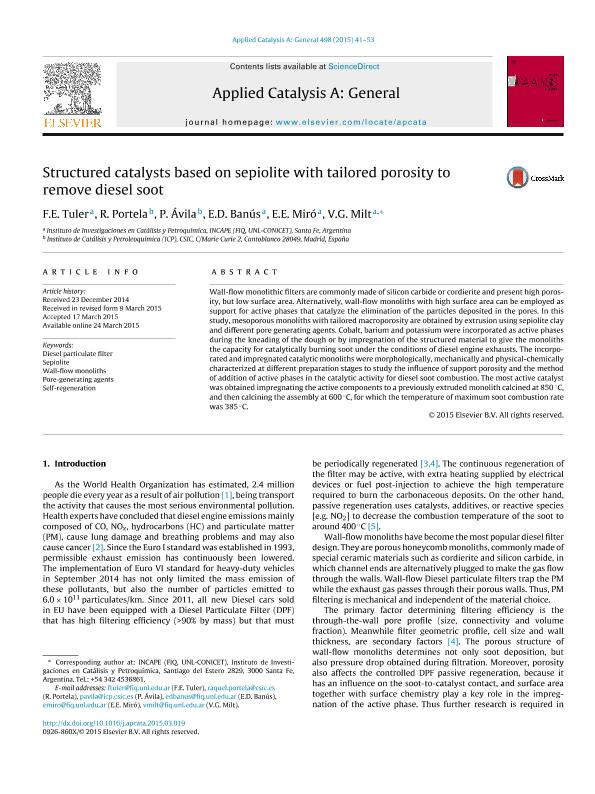Artículo
Structured catalysts based on sepiolite with tailored porosity to remove diesel soot
Tuler, Fernando Esteban ; Portela, R.; Ávila, P.; Banus, Ezequiel David
; Portela, R.; Ávila, P.; Banus, Ezequiel David ; Miro, Eduardo Ernesto
; Miro, Eduardo Ernesto ; Milt, Viviana Guadalupe
; Milt, Viviana Guadalupe
 ; Portela, R.; Ávila, P.; Banus, Ezequiel David
; Portela, R.; Ávila, P.; Banus, Ezequiel David ; Miro, Eduardo Ernesto
; Miro, Eduardo Ernesto ; Milt, Viviana Guadalupe
; Milt, Viviana Guadalupe
Fecha de publicación:
06/2015
Editorial:
Elsevier
Revista:
Applied Catalysis A: General
ISSN:
0926-860X
Idioma:
Inglés
Tipo de recurso:
Artículo publicado
Clasificación temática:
Resumen
Wall-flow monolithic filters are commonly made of silicon carbide or cordierite and present high porosity, but low surface area. Alternatively, wall-flow monoliths with high surface area can be employed as support for active phases that catalyze the elimination of the particles deposited in the pores. In this study, mesoporous monoliths with tailored macroporosity are obtained by extrusion using sepiolite clay and different pore generating agents. Cobalt, barium and potassium were incorporated as active phases during the kneading of the dough or by impregnation of the structured material to give the monoliths the capacity for catalytically burning soot under the conditions of diesel engine exhausts. The incorporated and impregnated catalytic monoliths were morphologically, mechanically and physical-chemically characterized at different preparation stages to study the influence of support porosity and the method of addition of active phases in the catalytic activity for diesel soot combustion. The most active catalyst was obtained impregnating the active components to a previously extruded monolith calcined at 850 °C, and then calcining the assembly at 600 °C, for which the temperature of maximum soot combustion rate was 385 °C.
Archivos asociados
Licencia
Identificadores
Colecciones
Articulos(INCAPE)
Articulos de INST.DE INVEST.EN CATALISIS Y PETROQUIMICA "ING. JOSE MIGUEL PARERA"
Articulos de INST.DE INVEST.EN CATALISIS Y PETROQUIMICA "ING. JOSE MIGUEL PARERA"
Citación
Tuler, Fernando Esteban; Portela, R.; Ávila, P.; Banus, Ezequiel David; Miro, Eduardo Ernesto; et al.; Structured catalysts based on sepiolite with tailored porosity to remove diesel soot; Elsevier; Applied Catalysis A: General; 498; 6-2015; 41-53
Compartir
Altmétricas



